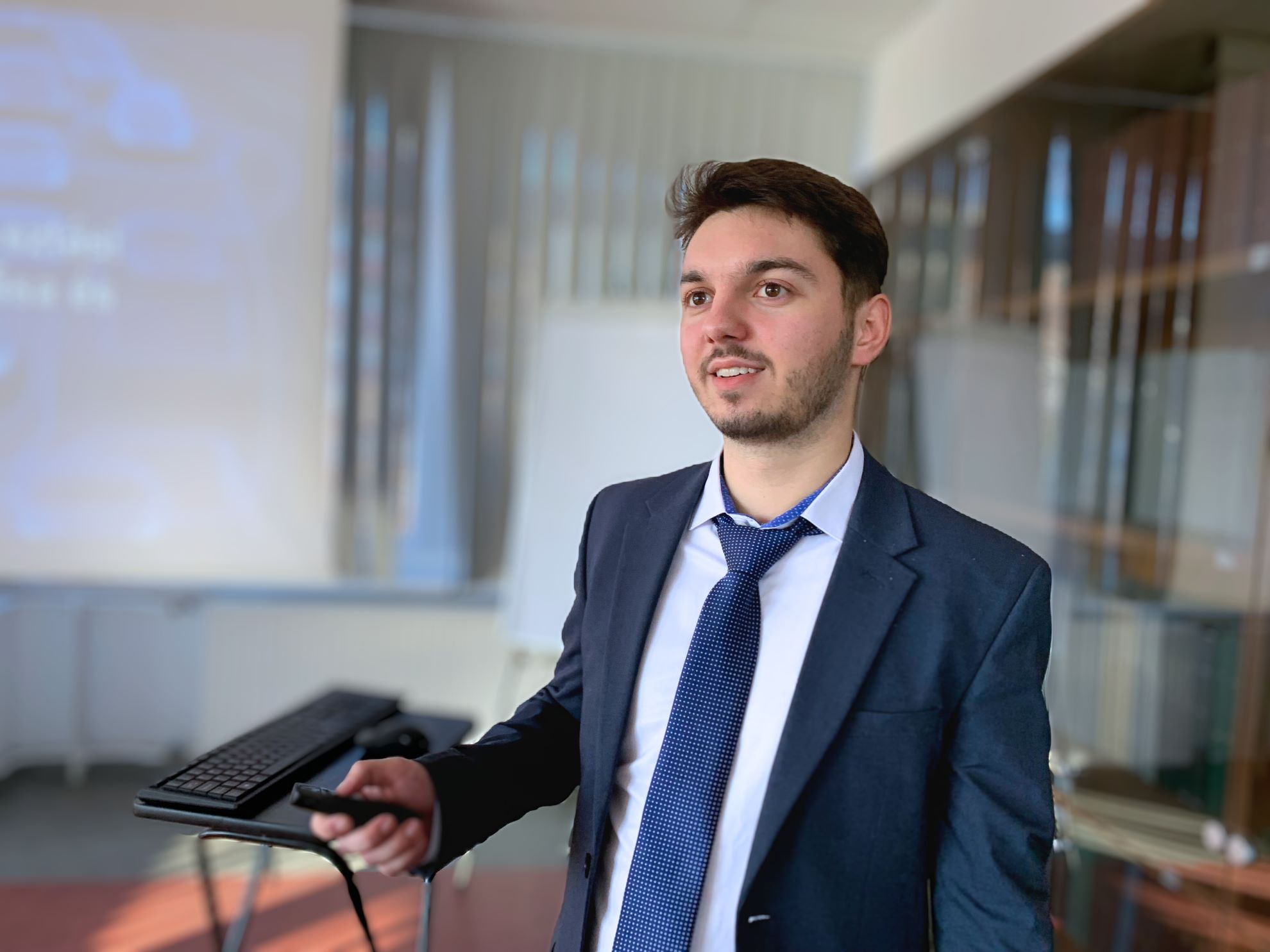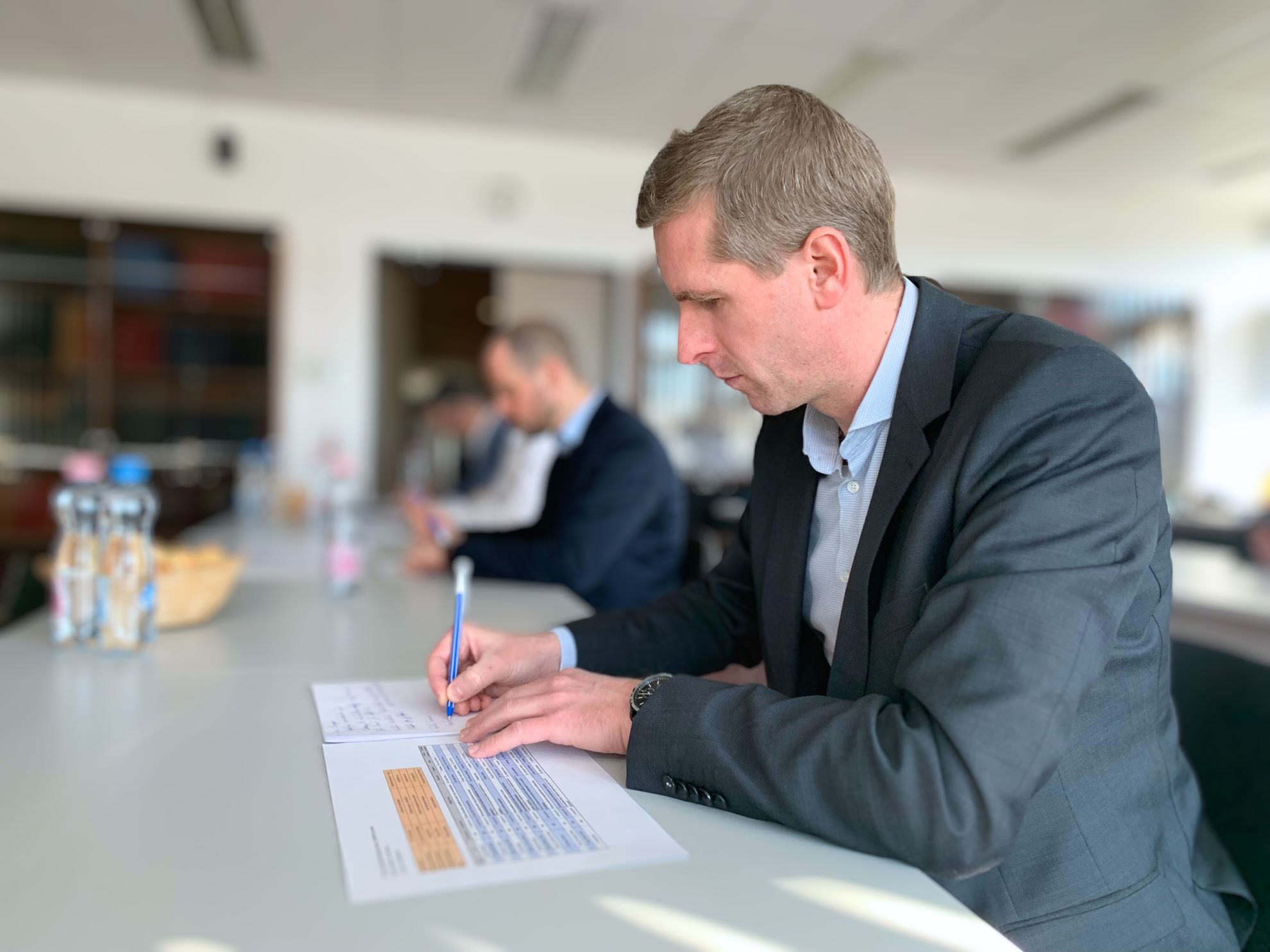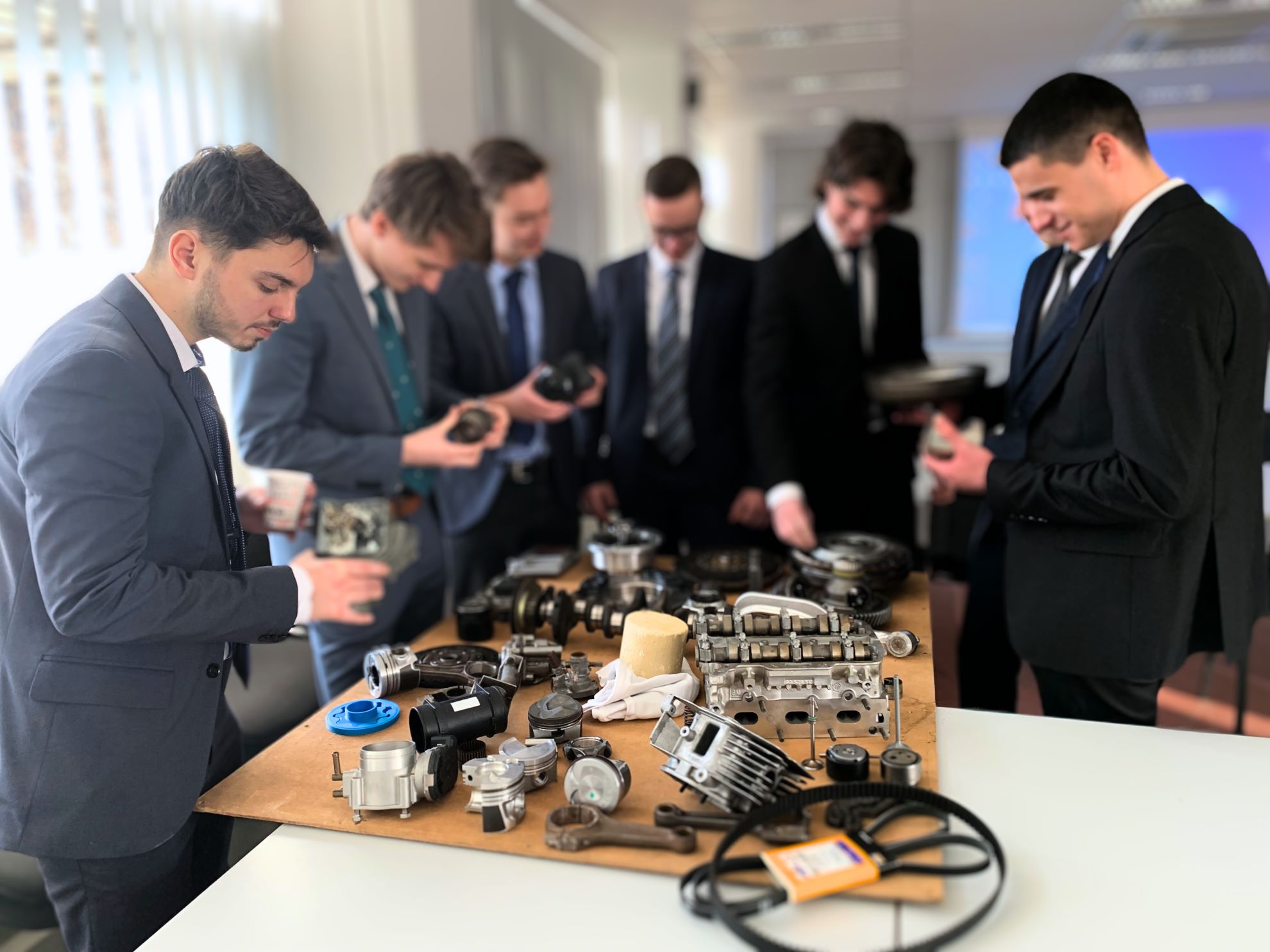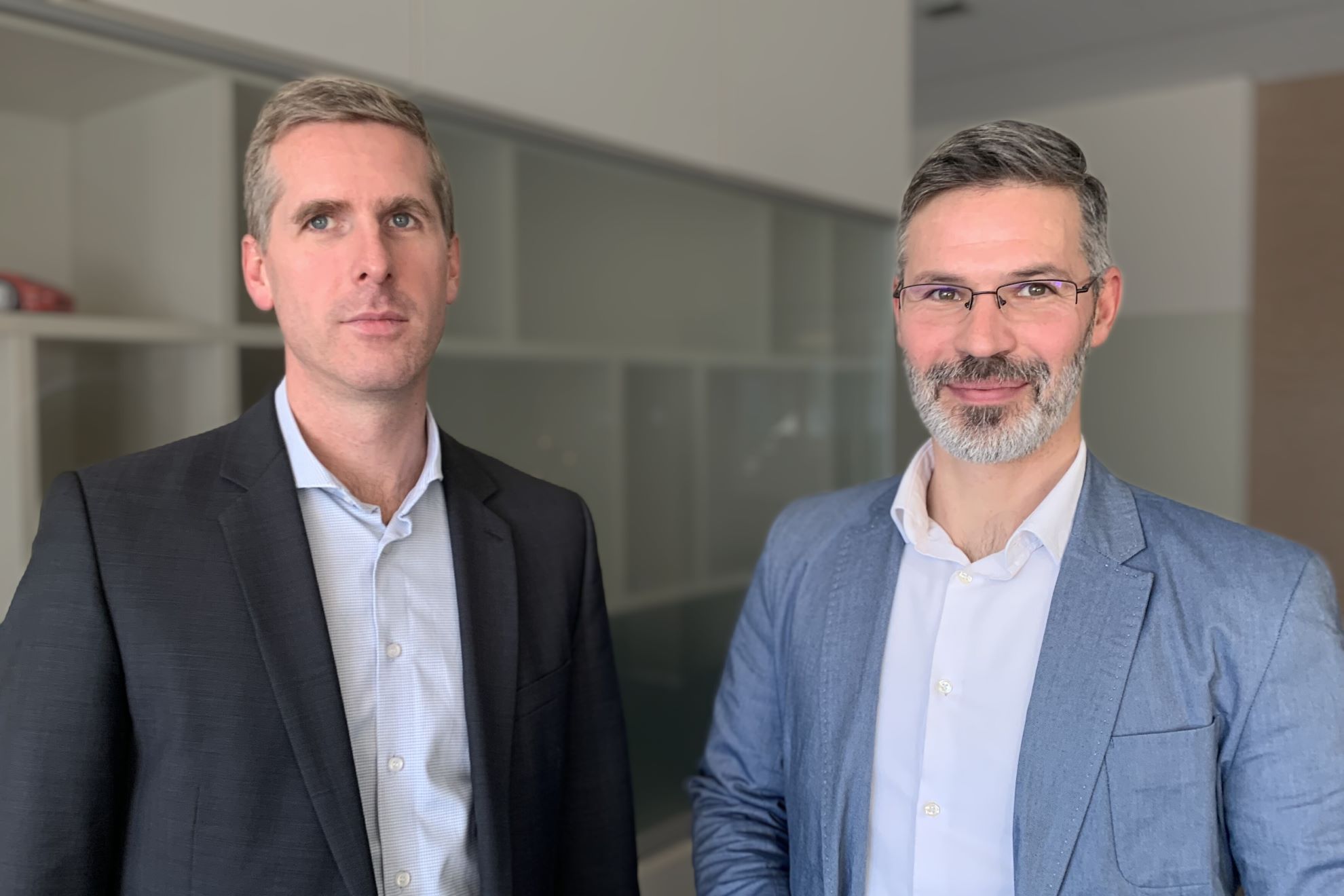Final exams from an “industrial” perspective
January is exam season, and therefore also the time for final exams. In our department, a total of 45 students are preparing for their final exams this January, 5 of them MSc students. The thesis topics are very diverse, ranging from autonomous vehicle control, 3D metal printing simulation to micromobility device design and beyond, with many exciting research topics. In our department, it is a tradition that the final examination committee includes not only our lecturers but also professors from other academic institutions and high-level executives from our industrial partners. During the lunch break of the exam day held on 11 January under the chairmanship of Dr. Árpád Török, we talked to István Lerchner, main department manager of AVL Hungary Kft. and Dávid Lengyel, System Development Group Leader at Robert Bosch Kft. about their experiences during the exams.

Mátyás Szabó
What is the history of the relationship with the department?
István Lerchner: Dávid and Máté Zöldy (Prof. Dr. Máté Zöldy is the head of the Innovative Vehicle Technologies research group at the department) and I have done studies together at the department, so we had some ideas on how to strengthen the cooperation. One of them was that we taught a calibration course, which is one of the focus topics of AVL, and about a year ago we started the MSC dual training, also on calibration. So we are looking for opportunities for cooperation.
What is it like to be involved in the final exams?
István Lerchner: It is interesting to see the graduates. Of course, we also meet them by the way they apply to us, but personally I come into contact with fewer of them, so it’s nice to be able to come here. Unfortunately, I see that those who are promising and present good work are usually already employed by this time, so it is not worth approaching them with a job offer.

Lerchner István
When are these commitments made?
Lerchner István: Usually, internships and thesis writing are a straight path to a job, as they get to know and like the company. This is also good for us, because we don’t have to train these colleagues and in some cases we have known the people we hire for years. So it’s a win-win situation. It works the same way in every company. Nevertheless, it’s good to see what the BSc students, the MsC students, know. You can see the difference. It’s interesting to see how presentation skills develop.
Dávid Lengyel: We are talking about twenty-year-old guys for whom professional presentations are not routine. Compared to the past years, we can actually see an improvement in this area. At the same time, I see a kind of dichotomy, because when I read through the essays, I see that the professional language is deteriorating. We are getting much closer to the spoken language, whose turns of phrase do not fit at all into a thesis.
István Lerchner: For example, I saw the word “aksi” twice in one of the essays.
Dávid Lengyel: I have the impression that we should pay more attention to the wording. Of course, the question arises whether it is about writing skills or general expressive ability. In my opinion, the problem is not fundamentally about writing skills. I often find that phrases appear reflexively in writing.
What could be the reason for this?
István Lerchner: In education, too, we must focus on the fact that it is not enough to have methodological knowledge, but I must be able to formulate the results of my calculations or even my research, I must be able to write a report on it, I must be able to present it. In industry, in applied engineering, this is just as important as how smart you are. Even if you are very clever, it is a problem if you can’t explain the results of your work to the client.
We are not researchers who lock ourselves up in the lab, we work for international companies, we are in contact with suppliers, OEMs, developers, Tier 1s, where communication and how we present something is very important.
So your perception is that the knowledge acquired here is high, but the communication skills are not sufficient in an industrial business environment?
Dávid Lengyel: Yes. I think that we have entered a communication space where the reflexive communication blocks that we brought from home 30-40 years ago and sharpened at school, which made us able to do well in our professional careers, are no longer sufficient.
Have expectations increased?
Dávid Lengyel: No, the environment in which we have to communicate has simply changed. 30 years ago, we used to say that if someone is a very good engineer, it’s okay if he can’t explain what he’s doing well, we’ll take the two and a half hours to understand what he measured and what he modified on that model. That is not possible now. There are many reasons for this. One is acceleration. In the development process, there is no longer a reserve time for someone to take more time to deliver the result of his work than it took to create it. There is also a much higher turnover in professional circles, so we are working with a less stable collegial circle. The routines of referring to the fact that I have been working here for 15-20-30 years and this gives me the opportunity to say in one conversation that it is okay that I did not understand now, but I will understand in the seventh conversation have disappeared, because in the seventh conversation one of the partners may not be there. They also have the effect that we have to ask for information and give it much more effectively. There is no training for that. We have learned this to a certain extent, and each person applies it according to his or her own abilities. What we are seeing now – and it is interesting that we are also seeing this changing expectation from the previous generation of engineers – it is not enough to do it well, you have to tell it well. And “saying it well” means that if you’re talking to a colleague at any level in your organisation, you need to be able to find the appropriate level of content to address them at the beginning of the conversation. This is increasingly expected in professional conversations. And this doesn’t just mean communication between management and operational levels, but at all levels. I find that it is not part of the training to prepare prospective colleagues to deal with these situations. For us engineers, it is a foreign discipline that has not been treated consciously and with the right emphasis in the past.
So these guys also need to be taught how to talk about what they are working on. I don’t just mean communication between them, sometimes they can’t even tell themselves what they are doing and why. Sometimes you have to learn the routines of this while you are working.
For us, it is good to see that someone already shows talent in this respect during their BSc training, because we can quickly integrate them into this environment, which is a much faster and more impulsive environment than the sheltered world of the university.
István Lerchner: It is striking to me that students, when they go on internships, often work more than they are at university.
Dr. Árpád Török: We have to find a balance that is rewarding also for students in the long run and that is satisfactory for industry and the university. This balance is still in the making.
So are students overburdened during their internships in industry?
István Lerchner: That is not the case. They get the opportunity to work alongside their university studies, and if the work is interesting and the environment is attractive, then some people start to neglect their university studies. I had a colleague who had been working as an engineer for two years and still didn’t have a degree. He was doing a good job, but we had to put it in his goals to get a degree.
Is there more motivation to work than to study?
Dávid Lengyel: There have been changes in this area as well. There has been an increased need among students to be able to do things in practice that have visible results. In addition to building up academic knowledge, it is particularly important for them to be able to apply what they know, and to be given a pat on the back for doing so! That’s a very good motivation, but we need to pay attention to it and take joint responsibility with the university to get the proportions right. It is an undeniable advantage for us if someone creates value. But we must not only look at value creation in the short term, but also consider why it is important that our colleague has the qualifications. On the one hand, this is the only way we can employ them in positions of certain responsibilities, and on the other hand, it is an important point of maturation and development that we cannot neglect. I am of the opinion that there is no stable equilibrium point, but that the optimal ratio of theoretical learning to practical work is constantly changing depending on the situation.
Another important phenomenon is that students, young engineers, cannot even see five years ahead, and we have to take this into account.
István Lerchner: When we got into a company, the most important thing was: well, we’re working here. Young people who come in today think they’ll work here for maybe 3-5 years and then try something else.
Dr. Árpád Török: Expectations and goals have changed. Newer generations are much more flexible.
István Lerchner: The opportunities have also changed. Now we are begging students to come and work for us. It’s not like it used to be, put your hands together to come and work for us. We no longer choose them, they choose us.
This reflects labour market supply and demand conditions. But is there a visible impatience in today’s generation to get feedback on their work quickly, and if it doesn’t come quickly enough, they switch?
István Lerchner: The praise, the positive feedback has to come back. Negative feedback is very disliked.
Dávid Lengyel: We know that the way to success is through failure. This generation has got a better handle on that. However, it is a cultural question what our feedback culture – whether in the private or professional sphere – is like. In the corporate environment, the pace of change is slower than today’s twenty-something generation would expect. It is important to see what their motivations are, where they are, what they are doing, what their skills are, what the environment is like in our company, and how we can bring the two together.

In the break of the exam

 BME GJT
BME GJT BME Kiss Viktor
BME Kiss Viktor